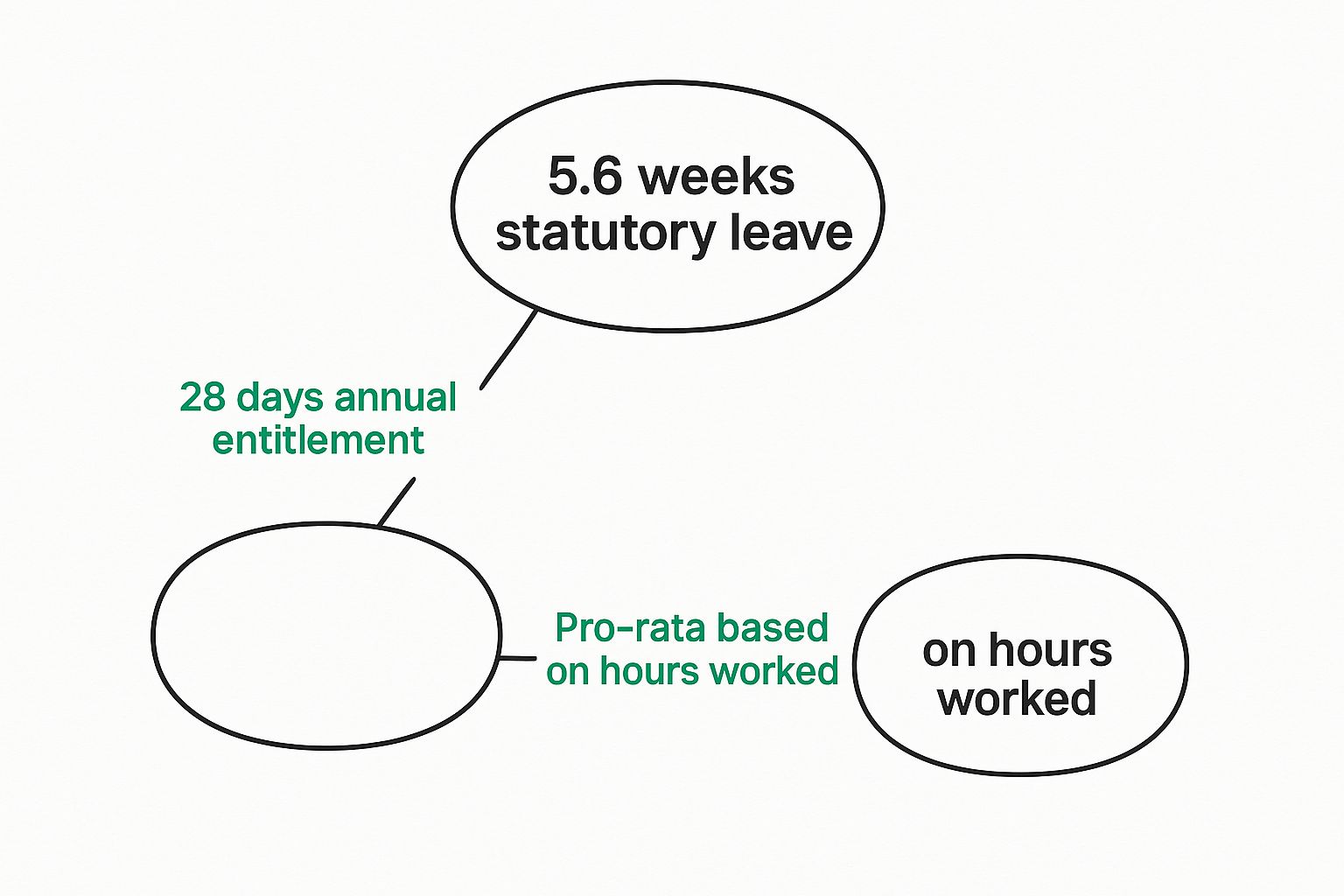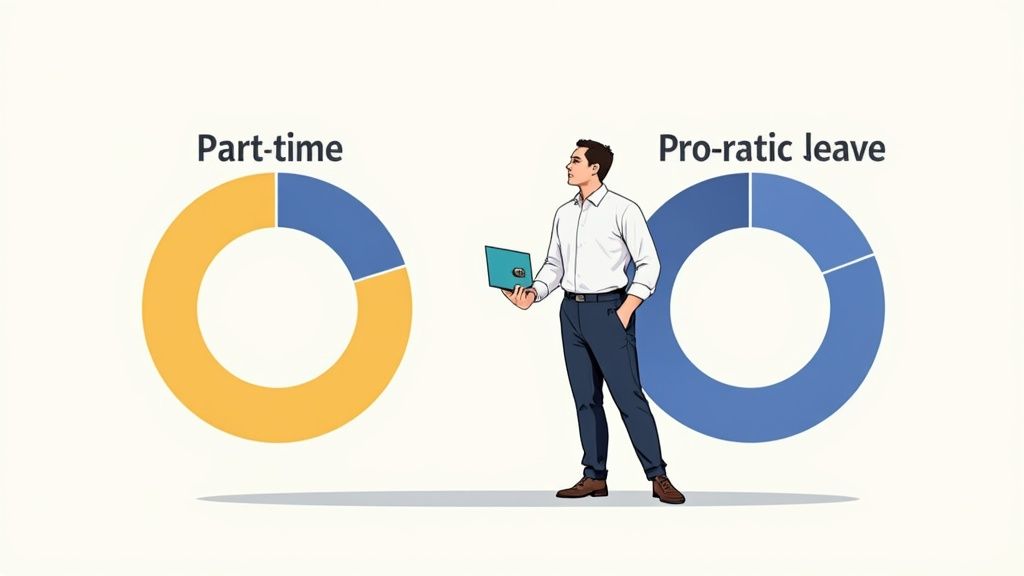
Legal UK Holiday Entitlement Explained | Know Your Rights
Posted by Robin on 08 Oct, 2025 in
Right, let's get one of the biggest questions out of the way first: what are you actually entitled to when it comes to paid time off?
The magic number, by law, is 5.6 paid weeks of holiday per year for most full-time workers. This is the absolute minimum your employer has to give you. For someone working a standard five-day week, this translates neatly into 28 days of paid leave.
It’s the foundation of your right to rest and recharge.
Understanding Your Basic Holiday Rights

Trying to figure out your holiday rights can sometimes feel like you’re reading the small print on a legal document, but the core idea is actually very straightforward. UK employment law has put a safety net in place to make sure everyone gets enough time away from their desk.
Think of this entitlement not as a company perk, but as a non-negotiable part of your employment.
This statutory minimum of 5.6 weeks wasn't just plucked out of thin air. It was established to help people strike a healthier work-life balance and protect their well-being. Simple maths for a typical Monday-to-Friday job gives us the figure most people know: 5.6 weeks x 5 days = 28 days.
But here’s where a lot of confusion creeps in: what about bank holidays? Are they included in that 28-day pot, or are they an extra bonus?
The Role of Bank Holidays
This is a big one. The 28 days can, and often does, include the usual bank holidays (there are typically 8 per year in England and Wales). An employer is perfectly within their rights to say that these public holidays count as part of your total 28-day allowance.
On the other hand, some employers offer a more generous package. They might give you 28 days of leave plus the bank holidays, which would take your total up to 36 days. The only way to know for sure is to check your employment contract. It has to spell out exactly how bank holidays are handled.
Key Takeaway: Your contract is the final word on whether bank holidays are part of your 28-day entitlement or an added extra. There’s no legal rule that forces employers to give you bank holidays on top of your statutory minimum.
UK Statutory Holiday Entitlement at a Glance
To put it simply, here is the baseline that the law sets out for full-time workers.
| Metric | Minimum Entitlement |
|---|---|
| Weeks | 5.6 weeks |
| Days (for a 5-day week) | 28 days |
This table shows the absolute minimum entitlement; many employers choose to offer more, but they can never offer less.
The Foundation of UK Employment Law
This right to paid leave is a cornerstone of UK employment law, built to ensure a fair deal for every worker. The law effectively provides 20 days of standard paid leave for your own holidays, with the other 8 days often aligning with bank holidays.
As many official guides point out, the minimum allowance itself is non-negotiable, even if your boss can decide whether bank holidays are part of that total. You can explore more about how the UK statutory holiday allowance is structured to see how it all fits together.
Getting your head around this basic framework is the first step. It gives you the confidence to check your contract, ask the right questions, and make sure you’re getting the downtime you are legally owed.
Calculating Holiday for Part-Time and Atypical Work
Not everyone works a standard nine-to-five, and this is where the legal UK holiday entitlement can seem a bit tricky. But the principle is always the same: everyone gets paid time off. The key is simply knowing how to adapt the calculation for your specific working pattern.
For part-time workers, the system is refreshingly straightforward. You get the same 5.6 weeks of holiday as a full-time employee, but a "week" is just defined by the number of days you normally work. This is what's known as a pro-rata basis.
Let's imagine you work three days a week. Your calculation is simple:
- 5.6 weeks (statutory entitlement) x 3 days (your working week) = 16.8 days of paid holiday per year.
This infographic helps show how the core ideas connect, from the legal baseline right through to how it’s applied for different work patterns.

As you can see, whether your holiday is measured in weeks, days, or hours, it all comes from the same fundamental right, just adjusted to fit your schedule.
Dealing With Irregular Hours and Zero-Hours Contracts
So, what about workers whose hours change every week or those on zero-hours contracts? Trying to calculate entitlement based on "days worked" just isn't going to fly. Instead, the law provides a different method based on hours.
For these kinds of work patterns, holiday entitlement is built up as a percentage of the hours you’ve actually worked. This makes sure your paid leave is a direct reflection of your contribution.
The standard accrual rate is 12.07% of hours worked. This figure comes from dividing the statutory 5.6 weeks of leave by the remaining 46.4 working weeks of the year (52 weeks - 5.6 weeks).
In practice, this means for every 100 hours you work, you earn about 12.07 hours of paid holiday. This system ensures that even if your hours are unpredictable, your holiday rights are protected and build up fairly over time. This pro-rata method is a cornerstone of fair employment, ensuring all workers get the rest they're due.
Putting the Calculation into Practice
Let’s apply this to a real-world scenario. Imagine you're on a zero-hours contract and you worked 80 hours over the last month.
Here’s how you would figure out your accrued holiday for that period:
- Hours Worked: 80 hours
- Accrual Rate: 12.07% (or 0.1207)
- Calculation: 80 hours x 0.1207 = 9.656 hours of paid leave earned.
Your employer should be tracking these accrued hours, adding them to your holiday balance each time you get paid. When you want to take a day off, you'd simply use the hours you have built up.
Making these calculations can sometimes feel complex, so using a dedicated tool can be a massive help. You can learn more about this by checking out our guide to using a UK holiday calculator.
How Your Holiday Pay Is Calculated

Taking a well-deserved break shouldn't come with financial anxiety. The whole point of legal UK holiday entitlement is simple: you should be paid your normal wage while you’re off. This stops you from being penalised for taking the time you've rightfully earned.
For anyone on a fixed salary with regular hours, it’s a straight swap. A week off work means you get a week's worth of your normal pay. Easy.
But life isn't always that straightforward, is it? What happens if your pay packet looks different from month to month because of overtime, commission, or bonuses? In that case, the calculation has to dig a little deeper to reflect what you actually earn on average.
The 52-Week Reference Period
When your pay fluctuates, employers can’t just guess. They have to look back at your earnings over the previous 52 weeks to work out your average weekly pay. This is known as the holiday pay reference period.
The goal is to get a fair average that includes everything that makes up your usual pay, not just your basic rate. It ensures that if you regularly pull in extra from overtime or smash your targets for a bonus, your holiday pay actually reflects that extra effort.
Important Note: When working this out, your employer should only count the weeks you were actually paid. Any weeks where you earned nothing – maybe you were on statutory sick pay or unpaid leave – have to be skipped. If they can't find 52 weeks of pay data, they're allowed to look back as far as 104 weeks to get the numbers they need.
This system is designed to paint a realistic picture of your typical earnings, making sure you get what you’re genuinely owed.
What Actually Counts as Normal Pay?
This is where things get interesting. The law is very clear that holiday pay can't just be based on your basic contractual hours if you consistently earn more than that. The calculation has to include all sorts of other payments.
So, your average weekly pay calculation should factor in:
- Commission payments that are directly tied to the work you do.
- Overtime, whether it’s guaranteed in your contract or non-guaranteed overtime you are required to work.
- Bonuses that are linked to your performance.
- Travel time payments, if they are a regular part of how you're paid.
Essentially, if a payment is a regular part of your salary, it should be in the mix. This stops employers from only paying your basic rate for holidays, which would leave you short compared to your usual take-home pay. Getting your head around this is the key to making sure your legal UK holiday entitlement is paid correctly.
Managing Holiday Accrual and Carry Over
Your holiday entitlement isn't something you're handed in one big lump on your first day. Instead, you earn it bit by bit as you work. This is called holiday accrual, and it kicks in the moment you start your job.
Think of it like a savings account for your time off. Every month, or even every week, you're making a small "deposit" into your holiday balance. This is crucial for new starters or if you leave part-way through the year, as it dictates exactly how much paid leave you're owed.
For a full-time employee, it's usually straightforward. They'll typically accrue one-twelfth of their annual holiday allowance each month. So, after working for three months, they'll have earned a quarter of their total annual leave.
Understanding Holiday Carry-Over Rules
So, what happens if you get to the end of the holiday year with unused days? Can you just roll them over? Well, it depends on the type of leave and, importantly, what your employer's policy says.
The law gives you the right to carry over some of your holiday if you couldn't take it because you were on certain types of leave, like maternity or long-term sick leave. For the first four weeks of your statutory holiday (which comes from the old EU Working Time Directive), employers have a duty to make sure you can take it. They can't just let those days vanish.
Your employment contract is the place to look for the final word. It will spell out the company's rules on carrying over any holiday that's above the legal minimum. Many employers are flexible and allow a few days to be carried forward, but they aren't legally obliged to for any extra contractual holiday.
This is a bigger deal than you might think. On average, UK employees leave around five days of holiday on the table each year. It’s a trend that really shows why having clear, well-communicated policies is so important. You can dig into more of these holiday usage trends over at Acas.
Special Cases for Accrual and Carry Over
Life happens, and certain situations have specific rules to protect your holiday rights. It’s worth getting your head around how these can affect you.
- During Sick Leave: You keep accruing your holiday entitlement as normal while you're off sick, no matter how long it is. If you're too ill to take your holiday, you're allowed to carry over up to four weeks of that unused leave into the next year.
- During Maternity, Paternity, or Adoption Leave: Your holiday allowance also keeps building up during these family-related leaves. Since you can't take annual leave at the same time, you are entitled to carry over your entire statutory 5.6 weeks into the next holiday year.
- Leaving a Job: When you hand in your notice, your employer has to pay you for any statutory holiday you've accrued but haven't taken. This makes sure you don't lose out on the value of the time you've earned.
Sometimes, especially if you've worked a lot of extra hours, an employer might offer an alternative to carrying over leave days. If you want to know more about this, take a look at our complete guide to time in lieu in the UK. Getting these rules right means you'll never miss out on the time off you're legally owed.
Your Rights and Your Employer's Obligations

When it comes to your legal UK holiday entitlement, think of it as a two-way street. It’s a carefully balanced partnership between your rights as an employee and your employer’s responsibilities, all governed by a clear set of rules designed to be fair to everyone.
Your employer has a non-negotiable duty to let you take your statutory leave. At the same time, they also have the right to manage when that leave is taken to keep the business running smoothly. This means you can’t just decide to take a week off tomorrow without getting it signed off first. There’s a proper process, and there are rules your employer has to follow if they need to say no.
Requesting and Refusing Holiday
So, how does it work in practice? The general rule of thumb is that you need to give notice that’s at least twice as long as the holiday you want to take. If you’re planning a week away, you should give at least two weeks’ notice. It's always worth checking your contract, though, as your company's policy might ask for a bit more.
On the flip side, an employer can refuse a holiday request, but they can't just do it on a whim. They need a solid business reason, like preventing a staff shortage during a critical project. If they do turn down your request, they must give you notice that is at least as long as the leave you asked for. So, if they refuse that one-week holiday, they have to tell you at least a week before you were due to be off.
Key Insight: That notice period for refusing leave isn’t just good manners—it’s a legal requirement. An employer can’t cancel your approved holiday at the last minute without potentially breaching your contract, unless there’s a genuine emergency or a specific clause in your contract that allows it.
For global companies hiring in the UK, getting these local nuances right is crucial. Many use Employer of Record (EOR) services to handle the complexities and ensure they’re fully compliant with UK employment law.
Special Circumstances and Final Pay
What happens when life gets in the way? Your holiday rights are protected. If you’re on long-term sick leave or parental leave (like maternity or paternity), you continue to build up your holiday entitlement just as you normally would. It’s a key protection that ensures you aren't penalised for being unwell or starting a family.
The rules around your legal UK holiday entitlement are also massively important when you leave a job. Any statutory holiday you’ve accrued but haven't used must be paid to you by your employer. This payment in lieu is a critical part of your final paycheck. For a deeper dive into how this is calculated, you can read up on the rules on holiday pay when an employee leaves.
To make things clearer, here’s a simple breakdown of who is responsible for what.
Holiday Entitlement Roles and Responsibilities
This table shows the fundamental duties of the employer and the corresponding rights of the employee, creating a clear and fair system for everyone.
| Area of Responsibility | Employer's Duty | Employee's Right |
|---|---|---|
| Booking Leave | To consider requests fairly and provide a valid reason for refusal. | To request leave and receive the correct notice if it's refused. |
| Payment for Leave | To pay your normal wage during statutory holiday periods. | To receive full pay for statutory leave, reflecting your average earnings. |
| Termination | To pay for any accrued but untaken statutory holiday. | To be paid for untaken statutory leave in your final pay. |
Ultimately, the whole framework is built on fairness. It gives businesses the control they need to plan their workforce effectively while guaranteeing your fundamental right to rest, recharge, and be paid for it.
The UK Holiday Entitlement Questions Everyone Asks
The official rules are one thing, but what do they actually mean when the rubber hits the road? Holiday entitlement can get complicated fast, so let's cut through the noise and tackle the real-world questions that pop up all the time.
Think of this as your go-to FAQ for those tricky "what if" scenarios. We've broken down the most common queries with straight-talking answers to help you understand your rights and your employer’s responsibilities.
Can My Employer Tell Me When to Take My Holiday?
In a word, yes. It often surprises people, but your employer absolutely has the right to dictate when you take your annual leave. This is most common for company-wide shutdowns, like closing the office between Christmas and New Year.
But they can't just drop it on you at the last minute. The law is very clear on this: they have to give you proper notice. The rule of thumb is that the notice must be at least twice as long as the holiday they’re asking you to take. So, if they want you to take one week off, they need to tell you at least two weeks beforehand. This is a core protection baked into the Working Time Regulations 1998.
What Happens to Bank Holidays If I Work Part-Time?
This is a big one. Part-time workers can’t be treated less favourably than full-time staff, and that principle extends to bank holidays. You’re entitled to a pro-rata share of them, just like the rest of your annual leave.
So, if a bank holiday happens to fall on a day you don't normally work, you don't just lose out. A good employer will either give you a paid day off in lieu to take another time or simply add the equivalent hours to your total holiday allowance. The goal is to ensure fairness for everyone.
A Fair Share for Everyone: The pro-rata principle ensures that a part-time worker's total holiday allowance, including their share of bank holidays, is proportional to the hours they work compared to a full-time employee.
This system prevents any disadvantage and makes sure your legal holiday entitlement is upheld, no matter your working pattern.
Will I Be Paid for Unused Holiday When I Leave a Job?
Yes, you will. This isn’t a company perk; it’s your statutory right. When you leave a job, your employer is legally obligated to pay you for any statutory holiday you’ve accrued but haven’t taken.
The calculation is pretty simple—it’s based on how far into the leave year you’ve worked. For instance, if you leave exactly halfway through the year, you’re owed payment for half of your total annual leave. This final payment should be included in your last payslip, and it’s a right that can't be signed away in an employment contract.
Can My Employer Pay Me Instead of Letting Me Take Holiday?
Generally, no. For your statutory minimum entitlement of 5.6 weeks, the law is crystal clear. This leave is there for you to rest and recover, so it must be taken as actual time off.
An employer can't offer you cash instead of a break. This practice, sometimes called 'rolled-up holiday pay', is unlawful. The only time you can be paid in lieu of taking leave is when you're leaving the company. However, if your contract gives you holiday above the statutory minimum, your employer can set different rules for that extra bit, which might include an option for payment instead.
Managing leave doesn't have to be a headache. Leavetrack replaces messy spreadsheets with a simple, centralised system for tracking holiday, approvals, and accruals, ensuring your team always stays compliant with UK rules. Discover how Leavetrack can simplify your absence management today.
